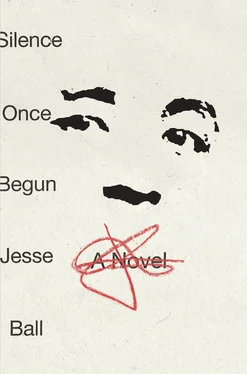INT.
Did you prepare it ahead of time?
MRS. ODA
Yes, I thought about it a few ways and tried it out. Then when I went I said it to him.
INT.
Would you want to say it now the way you said it, do you think you could still remember it?
MRS. ODA
Yes. I remember. I actually said it to him several times. He seemed to like it, so when I went there I said it a few times.
INT.
And could you say it now?
MRS. ODA
I can. Let me think a minute and I will be ready.
INT.
That’s fine. Do you want me to stop the tape?
MRS. ODA:
Just for a minute.
[ Int. note . Here I stopped the tape for approximately fifteen minutes while Mrs. Oda went about remembering her words. I got a glass of water for her from the kitchen and found something to do in another room. When I returned, she was ready.]
INT.
The tape-device is recording.
MRS. ODA
I said to him, I said: When you were four, your father and I had a thought that we should perhaps travel to different waterfalls, that it might be a good thing to see all the waterfalls we could. So, we began to go to waterfalls whenever we had a chance. That year I believe we saw thirty waterfalls, in many places. We developed a routine for it. We would drive there and get out. Your father would pick you up. He would say to you, Is this the right waterfall? and you would say, No, not this one. Not this one . We went all over. There are really more waterfalls than one thinks. When he talked to me about the project, I said, I don’t know how many waterfalls there are to go to, but I was wrong, there are many. It was just the three of us in the car then, as your sister and brother weren’t born yet. Just the three of us, riding along. We would go down these tiny roads, past fields and rice paddies. We would have to stop to ask directions of the strangest people. But everyone seemed to understand what we were doing. It was never hard to explain it. We are going to see many waterfalls. And the person would say that that was a good thing to do, and that right that way was another waterfall, a very fine one, quite worth seeing. Then we would go on down the road, and pull up at the place. I would get out, I would get you out. You would go to your father. Then the two of you, the two of you would go to the edge of the water. Your father would cock his ear to listen, and you would imitate him. We didn’t have a camera, so I don’t have any pictures of it. But the two of you would listen to the waterfall for quite a while. Then he would pick you up and he would say, Son, is this the right waterfall? and you would say, No, not this one. Not this one . Then we would sit and have some food that we had brought. We would look at the waterfall some more and sometimes talk about what was particular about it. Then we would get in the car and go. Your father would never look back at the waterfall as we were leaving, but you would always turn around as best you could and try to look out the window or over the backseat to see it as we drove away. When finally we had been going for months and seen many many waterfalls, we went to one that we had missed, one that was actually rather close to where we lived. It was a rainy day. It had started out pleasant, with blue skies and fine white clouds, but while we were driving there came many gray clouds that were nearly black from the north and west and with them all kinds of rain. Your father did not want to stop. It was very close, this waterfall, he said, and it was a part of the expedition that we would not turn back. So, we got there in the rain and when we did, the rain cleared. We sat in the car for a few minutes and then got out. It was a very small waterfall, one of the smaller ones we had seen. That was probably why no one said anything about it to us when we were trying to find the waterfalls. But when you and your father had listened for a while, and when he lifted you up and he asked you, Son, is this the right waterfall? you laughed and laughed. You didn’t say anything, you just laughed and laughed. And so he said to you again, Is this the right one? Is this it, the right waterfall? and you said, Yes, this is the one we have been looking for . Then when your sister and brother were born, and we would go on family picnics, we often went there, but we did not talk about our waterfall expedition, and because you had been so young, you never remembered it. You didn’t know why that was the waterfall we always went to, or that you had chosen it from all the waterfalls we had seen. We didn’t know anyway, why it was the right one, your father and I. Or maybe he knows, but I don’t know.
(Mrs. Oda begins to cry. I pass her a handkerchief. She refuses it.)
INT.
And did he say anything to that?
MRS. ODA
He watched me the whole time, sitting with his back to the wall, he was watching me very closely. His eyes changed while I was watching so I knew that it affected him, and that is why I came back and said it again and again. I felt that it was affecting him, whether he would talk or not.
The guards I spoke to said Oda dealt poorly with being in jail.
Of course, the newspapers were readily available to the guards and so they read about Oda and about what had happened, and were deeply prejudiced against him on account of the confession he had signed, which seemed to reveal his guilt beyond any doubt.
This is a peculiar matter, because the confession should not have been available to the press. Indeed, the actual confession was not. However, it seems that on the evidence of: a. witnesses seeing Oda Sotatsu dragged away from his house, and b. data from an anonymous source supplied to the press, the newspapers gained the knowledge they needed to investigate further, at which point perhaps police officials disclosed information. What happened precisely is unknown. That there were many newspaper accounts linking the Narito Disappearances to Oda Sotatsu via his own signed confession is beyond doubt.
This led to Oda being dealt with harshly, most particularly because he would not cooperate. He was kept separate from the other prisoners, and visited almost constantly by a series of officials attempting to get information from him. The interrogations that have been made available to me form a part of this narrative, as you know, but are, I suspect, the least part of the many interrogations that took place. It is clear that the guards often would not allow him to sleep ahead of an interrogation in the hopes that it would weaken his will. However that may be, it appears, from the transcripts that we have, that it was not an effective strategy in this case.
Oda Sotatsu was in jail at the police station for a period of twenty days prior to charges being brought. He was then moved to a different facility, for the trial. The entire case was evidently expedited, possibly because of the enormous media scrutiny, and as well because of the confession, and because Oda refused to deal with any potential representation he would have in court.
[ Int. note . Oda Minako, Sotatsu’s sister, was living elsewhere, possibly in Korea, when I began this series of interviews. It was important enough to her, when the family spoke about what I was doing, that she chose to return to Japan for some days to speak to me. These interviews also took place in the house I had let. She was an attractive woman, older, of course, and dressed very professionally. It seems she had acquired an advanced education, and was actually a professor at a university in Korea, in what subject I do not recall. She had been away at her studies when Sotatsu was apprehended by the police, and she returned from Tokyo to visit him. She was uncertain of the day, or whether her visits followed or preceded those of other family members. She did say that a childhood friendship with one of the police officers permitted her to actually enter the cell and sit with him, something allowed none of the other family members, and something mentioned by no other source.]
Читать дальше












